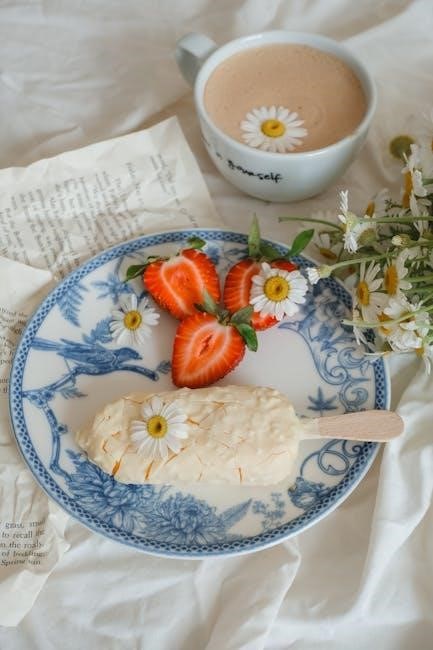Discover the joy of crafting soothing herbal teas at home. From chamomile to mint, explore simple, healthy blends that promote relaxation, energy, and overall well-being in every sip.
Why Homemade Herbal Teas Are Popular
Homemade herbal teas have gained immense popularity due to their health benefits, customization, and cost-effectiveness. Many people appreciate the ability to craft blends tailored to their specific needs, whether for relaxation, energy, or digestive health. The simplicity of using fresh or dried herbs, along with the joy of experimenting with flavors, makes homemade teas a favorite. Additionally, avoiding additives and preservatives found in commercial products attracts health-conscious individuals. The accessibility of herbal tea recipes online has further fueled this trend, allowing anyone to create soothing blends in the comfort of their own home. This practice fosters a sense of wellness and self-care.
Benefits of Making Herbal Teas at Home
Making herbal teas at home offers numerous benefits, including improved health, cost savings, and the ability to customize flavors. By using fresh or dried herbs, individuals can create blends that cater to specific health needs, such as boosting immunity, aiding digestion, or promoting relaxation. Homemade teas allow for control over ingredients, avoiding additives and preservatives found in store-bought options. This practice also encourages mindfulness and self-care, as brewing tea becomes a calming ritual. Additionally, experimenting with different herbs and spices fosters creativity and provides a sense of accomplishment. Overall, homemade herbal teas are a simple yet effective way to enhance well-being and enjoy a soothing, personalized beverage.
Overview of Herbal Tea Ingredients
Herbal tea ingredients are diverse, ranging from flowers, leaves, roots, and spices. Common herbs include chamomile for relaxation, hibiscus for its tart flavor, and lemon verbena for a citrusy taste. Mint and ginger are popular for their refreshing and digestive properties. Additional ingredients like honey, lemon, and spices such as cinnamon or cloves can enhance flavor. Fresh or dried herbs can be used, with dried herbs being more concentrated. This variety allows for endless customization, catering to different tastes and health goals. Whether you prefer floral, spicy, or fruity notes, herbal teas offer a versatile way to enjoy a soothing, caffeine-free beverage.
Essential Ingredients for Herbal Teas
Essential ingredients include chamomile, hibiscus, lemon verbena, mint, and ginger. Use fresh or dried herbs; dried are more potent. Honey or spices can enhance flavor for tailored blends.
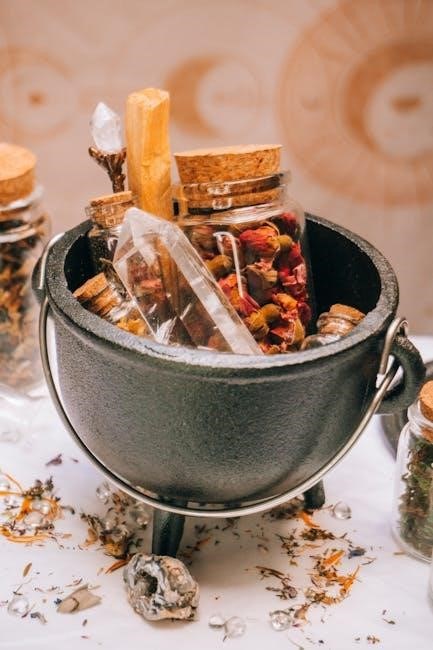
Common Herbs Used in Herbal Tea Recipes
Chamomile, hibiscus, lemon verbena, and mint are popular herbs in homemade teas. Chamomile promotes relaxation, while hibiscus offers antioxidant-rich, caffeine-free options. Lemon verbena aids digestion and uplifts mood. Mint refreshes and supports urinary health. Ginger, known for immune support, is often combined with honey for added sweetness. Rose petals add floral notes and emotional balance. Calendula and dandelion root are used for skin and liver health. These herbs can be blended to create unique, flavorful teas tailored to specific health needs. Fresh or dried, they provide versatility for crafting soothing, natural beverages at home.
Understanding Fresh vs; Dried Herbs
Fresh herbs offer vibrant flavors and aromas, ideal for delicate teas, while dried herbs are more potent and convenient for storage. Use 2 tablespoons of fresh herbs or 1 teaspoon of dried per cup of boiling water. Dried herbs retain their benefits longer, making them perfect for year-round use. Fresh herbs release oils quickly, requiring shorter steeping times. Both options enhance tea blends, but dried herbs are often preferred for consistency and shelf life. Understanding this balance helps in crafting teas that are both flavorful and effective for health benefits like relaxation, digestion, and immune support.
Additional Ingredients for Enhanced Flavor
Elevate your herbal teas with natural enhancers like honey, lemon, or spices. Honey adds sweetness without refined sugars, while lemon juice brightens flavors. Spices such as cinnamon or ginger provide warmth and depth. Floral elements like rose petals or lavender buds introduce delicate notes. Citrus peels, like orange or lemon, add a refreshing tang. These ingredients not only enhance taste but also boost the tea’s aromatic profile. Experimenting with milks, such as almond or oat, can create creamy textures. Discover how these additions transform simple blends into unique, delicious concoctions tailored to your preferences and health goals.
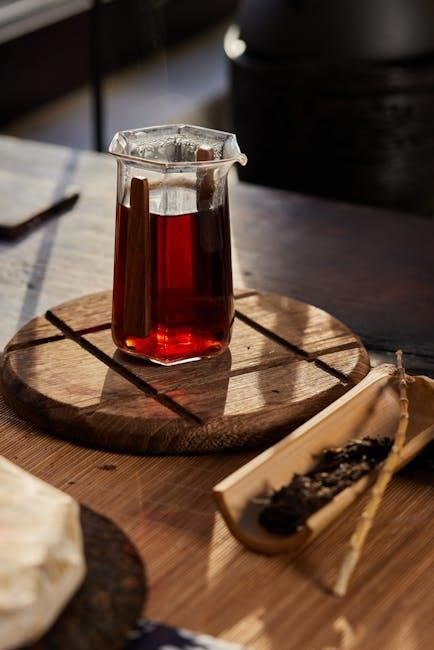
Basic Herbal Tea Recipe
A simple blend of 1 teaspoon dried herbs or 2 teaspoons fresh herbs steeped in boiling water creates a soothing, customizable base for all recipes.
Step-by-Step Guide to Making Herbal Tea
To make herbal tea, start by boiling fresh water and pouring it over your chosen herbs. Use 1 teaspoon of dried herbs or 2 teaspoons of fresh herbs per cup of water. Cover the mixture to prevent the loss of beneficial oils. Allow the herbs to steep for 10–15 minutes, depending on the desired strength. Strain the tea into a cup using a fine sieve or cheesecloth. Discard the solids and enjoy your tea hot or iced. For added flavor, consider sweetening with honey or enhancing with lemon. This simple process ensures a perfect cup every time, tailored to your taste preferences.
Basic Tea Recipe for Beginners
A simple herbal tea recipe for beginners involves combining 1 teaspoon of dried herbs (or 2 teaspoons of fresh herbs) with 1 cup of boiling water. Pour the water over the herbs in a heat-resistant container, cover, and let steep for 10–15 minutes. Strain the mixture into a cup using a fine sieve or cheesecloth. Discard the solids and enjoy your tea hot or iced. For added flavor, sweeten with honey or enhance with a squeeze of lemon. This easy-to-follow method ensures a delicious and soothing cup of herbal tea, perfect for those new to homemade blends. Experiment with different herbs to find your favorite flavors and benefits.
Understanding Tea Ratios (Parts and Measurements)
Herbal tea recipes often use ratios to simplify blending, with ingredients measured in “parts” by volume or weight. A basic ratio is 1 teaspoon of dried herb or 2 teaspoons of fresh herb per 1 cup of boiling water. For blends, ratios like 2 parts chamomile to 1 part lemon balm ensure balance. Measurements can vary based on desired strength and effect. Using standardized ratios helps maintain consistency, allowing you to scale recipes up or down easily. This method also ensures that each herb’s properties are evenly distributed, making it easier to customize teas for specific health benefits like relaxation or immune support. Precision in ratios enhances both flavor and effectiveness.
Popular Herbal Tea Recipes
Explore soothing herbal tea recipes, from calming chamomile to invigorating mint and spicy ginger, each offering unique health benefits and flavors for every occasion.
Chamomile Honey Tea for Relaxation
Chamomile honey tea is a soothing blend perfect for unwinding after a busy day; It combines the calming effects of chamomile flowers with the sweetness of pure honey. To make this tea, steep 1 teaspoon of dried chamomile flowers in 1 cup of boiling water for 5-7 minutes. Strain the mixture, then add 1 tablespoon of honey to taste. This tea is known for its ability to reduce stress, improve sleep quality, and promote a sense of calm. Its gentle, floral flavor makes it a popular choice for those seeking relaxation and tranquility. Enjoy it hot or iced for a refreshing, caffeine-free drink.
Hibiscus Rose Petal Punch for Stress Relief
Hibiscus rose petal punch is a vibrant, refreshing blend that combines the tartness of hibiscus flowers with the delicate sweetness of rose petals. To make this tea, steep 1 tablespoon of dried hibiscus flowers and 1 teaspoon of dried rose petals in 2 cups of boiling water for 10-12 minutes. Strain and add honey or lemon to taste. This caffeine-free tea is rich in vitamins and antioxidants, offering a natural way to alleviate stress and promote relaxation. Its fruity and floral notes make it a perfect choice for unwinding after a long day or serving at social gatherings. Enjoy it hot or chilled for a revitalizing drink.
Lemon Verbena Tea for Digestive Health
Lemon verbena tea is a citrusy, aromatic brew known for its digestive benefits. To prepare, steep 1 teaspoon of dried lemon verbena leaves in 1 cup of boiling water for 5-7 minutes. Strain and enjoy, optionally sweetened with honey; This herbal infusion aids in soothing the digestive system, alleviating bloating, and enhancing digestion. Its light, lemony flavor makes it a refreshing post-meal drink. Regular consumption may also support overall gut health. Perfect for those seeking a natural, caffeine-free remedy to ease digestive discomfort and promote well-being. Its subtle sweetness and invigorating aroma create a delightful experience for the senses, fostering relaxation and balance.
Mint Tea for Urinary Tract Health
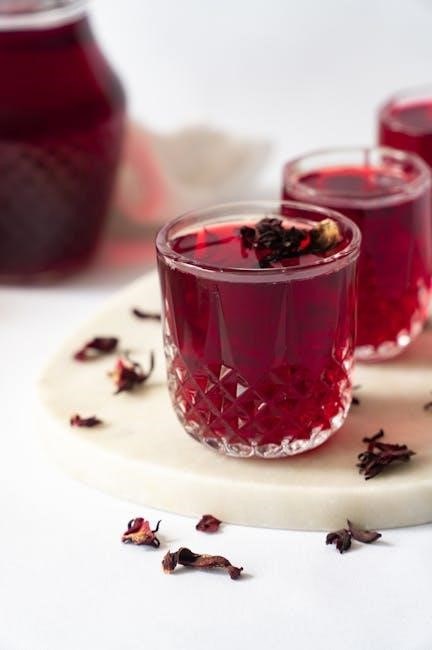
Mint tea is a refreshing and natural remedy for urinary tract health. Known for its diuretic properties, it helps cleanse the urinary system and reduce inflammation. Steep 1 tablespoon of fresh mint leaves or 1 teaspoon of dried mint in 1 cup of boiling water for 5-7 minutes. Strain and drink hot or iced, optionally sweetened with honey. Regular consumption may aid in preventing urinary tract infections and soothing discomfort. The cooling effect of mint also supports overall bladder health, making it a popular choice for those seeking a caffeine-free, herbal solution to promote urinary well-being and maintain a healthy digestive system naturally.
Ginger Tea for Immune Support
Ginger tea is a potent and comforting drink that boosts immunity while soothing the body. Sliced or grated fresh ginger root—about 1-2 tablespoons—is steeped in boiling water for 10-15 minutes. Strain and enjoy with optional honey or lemon. Ginger’s active compounds like gingerol fight inflammation and enhance immune function. Regular consumption may reduce cold symptoms and support digestion. This easy-to-make tea is a natural remedy for seasonal health and overall wellness, providing a spicy yet calming experience that strengthens the body’s defenses and promotes vitality throughout the year, making it a popular choice for immune-boosting herbal remedies and cozy winter nights alike.
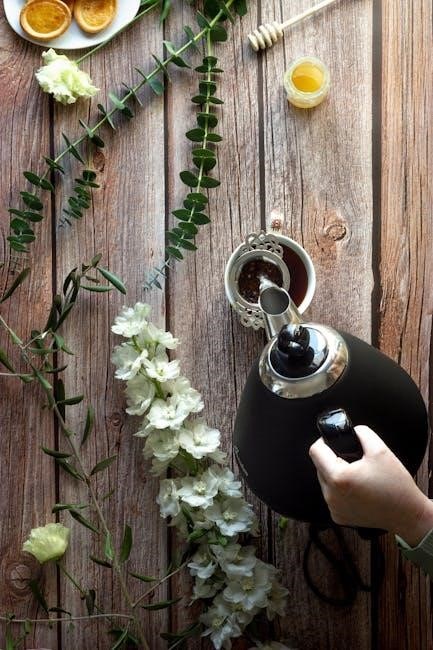
Health Benefits of Herbal Teas
Herbal teas enhance mental clarity, support liver health, and improve emotional balance. They promote holistic wellness by combining natural ingredients to address various health needs effectively and naturally.
Herbal Teas for Sleep and Relaxation
Herbal teas are a natural remedy for promoting restful sleep and reducing stress. Chamomile tea, with its calming properties, is a popular choice for unwinding before bed. Lavender and valerian root teas also help regulate sleep patterns and ease anxiety. These blends work by soothing the mind and body, creating a peaceful environment for relaxation. Regular consumption can improve sleep quality and duration, leading to better overall well-being. By incorporating these teas into your evening routine, you can naturally combat insomnia and wake up feeling refreshed and rejuvenated. Herbal teas offer a safe and effective way to support your sleep health without harsh chemicals.
Herbal Teas for Digestive Health
Herbal teas offer natural solutions for digestive well-being. Lemon verbena and peppermint teas are known to ease bloating and indigestion, while ginger tea aids in soothing nausea and cramps. Fennel and chamomile teas also support a healthy gut by reducing inflammation and promoting relaxation. These teas can be easily made at home using fresh or dried herbs, providing a gentle and effective way to address common digestive issues. Incorporating them into your daily routine can enhance digestion, alleviate symptoms of irritable bowel syndrome, and improve overall gut health naturally. Homemade herbal teas are a simple yet powerful tool for maintaining a balanced digestive system.
Herbal Teas for Immune Support
Boost your immune system with herbal teas packed with vitamins and antioxidants. Ginger tea is renowned for its anti-inflammatory properties, while elderberry tea is rich in vitamins A and C, enhancing immune function. Echinacea tea is often consumed to fight off colds and flu, and lemon balm tea offers antiviral benefits. These teas can be combined with honey for added sweetness and health benefits. Making them at home allows for customization, ensuring you get the most from each herb. Regular consumption of these teas can help fortify your defenses, reduce illness severity, and support overall immune health naturally and effectively.
Herbal Teas for Brain Function and Liver Support
Enhance cognitive health and liver function with carefully crafted herbal teas. Ginkgo biloba tea improves blood flow to the brain, boosting memory and focus, while peppermint tea refreshes the mind and aids digestion. For liver support, milk thistle tea is renowned for its detoxifying properties, protecting liver cells from damage. Turmeric tea also offers anti-inflammatory benefits, supporting both brain and liver health. These teas can be combined in homemade blends to maximize their effects. Making them at home allows for precise customization, ensuring you harness the full potential of each herb to promote mental clarity and overall well-being naturally and effectively.
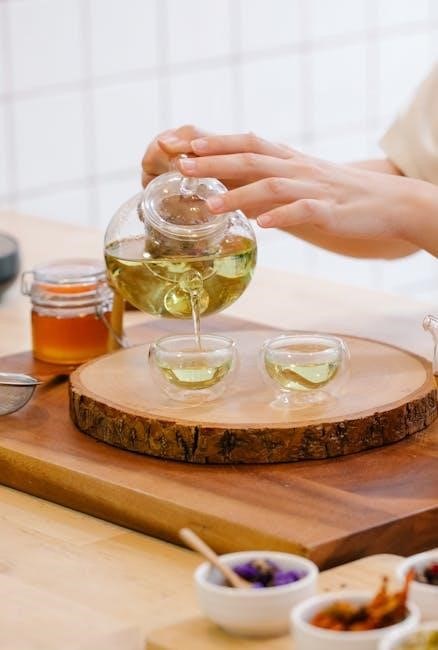
Advanced Herbal Tea Blends
Explore complex herbal combinations for enhanced well-being. Blends like Rejuvenation Tea (ginkgo, rose petals) and Spiced Relief Tea (ginger, cinnamon) offer targeted health benefits and unique flavors.
Rejuvenation Tea Recipe
This refreshing blend combines 1 part dried ginkgo biloba, 1 part rose petals, and 1 part peppermint leaves. Boil 1 cup of water, add the herbs, and steep for 10-12 minutes. Strain and enjoy hot or iced. Optional: Add honey for sweetness. This tea supports mental clarity and relaxation, perfect for unwinding after a busy day. The rose petals add a floral touch, while peppermint invigorates the senses. A simple yet effective way to rejuvenate your mind and body at home. Pair it with your favorite plant-based milk for a creamy twist.
Spiced Relief Tea for Cold and Flu
This warming tea is designed to ease cold and flu symptoms. Combine 1 teaspoon of ground cinnamon, 1 teaspoon of fresh ginger, and 1 teaspoon of dried lemon balm. Add 1 cup of boiling water, steep for 8-10 minutes, then strain. Optional: Stir in 1 tablespoon of honey and a squeeze of fresh lemon juice. The cinnamon and ginger provide anti-inflammatory properties, while lemon balm offers a refreshing citrus note. This blend soothes sore throats, eases congestion, and boosts immunity. Perfect for a cozy remedy during the winter months, it’s a natural way to feel better without any harsh chemicals. Enjoy daily for maximum benefits.
Tea for Nervousness and Anxiety
Calming herbs like chamomile, lavender, and lemon balm are perfect for soothing nervousness and anxiety. Combine 1 teaspoon of dried chamomile flowers, 1 teaspoon of dried lavender buds, and 1 teaspoon of fresh lemon balm leaves. Steep in 1 cup of boiling water for 5-7 minutes, then strain. Add 1 tablespoon of honey for sweetness. This blend promotes relaxation, reduces stress, and calms the mind. Optional: Include 1 teaspoon of passionflower or valerian root for enhanced anxiety relief. Drink 1-2 cups daily to find peace and balance. A natural, comforting remedy for emotional well-being, this tea helps quiet the mind and ease tension without side effects.
Tummy Tea for Upset Stomach
Soothe an upset stomach with a gentle blend of digestive-friendly herbs. Combine 1 teaspoon of dried peppermint leaves, 1 teaspoon of ginger root, and 1 teaspoon of fennel seeds. Steep in 1 cup of boiling water for 5-7 minutes, then strain. This tea eases bloating, cramps, and indigestion. Optional: Add 1 teaspoon of chamomile for calming effects. Honey or lemon can enhance flavor. Drink 1-2 cups after meals or when symptoms arise. A natural remedy for digestive discomfort, this tea supports gut health and provides quick relief from nausea and upset stomachs, helping you feel better naturally.
Crafting homemade herbal teas offers a natural way to enhance health and relaxation. With countless recipes, experiment with herbs and flavors to find your perfect blend for wellness and enjoyment.
Final Tips for Making Herbal Teas at Home
Start with a basic recipe and adjust measurements to suit your taste preferences. Use fresh or dried herbs, ensuring proper steeping times for optimal flavor and benefits. Experiment with sweeteners like honey or lemon for enhanced taste. Store herbs in airtight containers to preserve potency. Always use clean, filtered water for brewing. Consider blending herbs for unique flavor profiles and health benefits. Keep notes of your creations to refine recipes over time. Most importantly, enjoy the process of creating your own herbal teas and share your favorite blends with others. Happy brewing!
Encouragement to Experiment and Share Recipes
Embrace the creativity of homemade herbal tea-making by experimenting with unique herb combinations and flavors. Share your favorite recipes with friends and family, spreading the joy of natural wellness. Discover new blends by swapping ingredients or adding sweeteners like honey for a personalized touch. The beauty of herbal teas lies in their versatility, allowing you to craft something truly special. Don’t hesitate to explore beyond traditional recipes—your next favorite blend might be just a steep away! Sharing your creations fosters connection and inspires others to embrace the simplicity of homemade teas. Let your passion for herbal teas become a gift to those around you.
